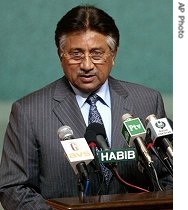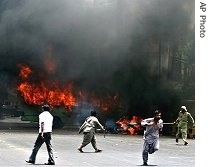2007年VOA标准英语-Political Crisis Grows in Pakistan(在线收听)
Washington
18 May 2007
The dismissal of Pakistan's most senior judge has mushroomed into a domestic political crisis for President Pervez Musharraf. The weakened opposition has found a new vigor to push for an end to President Musharraf's military rule. As VOA correspondent Gary Thomas reports, a showdown appears to be looming.
 |
| Gen. Pervez Musharraf addresses 34th session of the Islamic Conference of Foreign Ministers in Islamabad, 15 May 2007 |
In a telephone interview, former Pakistan Prime Minister Benazir Bhutto, a sharp critic of Mr. Musharraf, says the situation in Pakistan is precarious.
"It's threatening to spiral out of control," she said. "I think the regime still has initiative in its hands, but it needs to take certain political steps and be ready to make political compromises. But if it sticks to its stand and refuses to negotiate with the opposition, and tries to suppress the opposition movement, then I think the matter will just spiral out of hand."
The stage appears set for such a confrontation. President Musharraf told Pakistan's private Aaj news channel that Ms. Bhutto and another exiled former prime minister, Nawaz Sharif, would not be allowed to return to compete in the national elections scheduled for later this year.
"About their return, no, nobody is returning before elections," he said.
But Ms. Bhutto says she will defy the president's ban, and may do it sooner than she had originally planned.
"I certainly plan to go back later this year," she said. "I was planning to do that against the background of the elections. But I am now reviewing the situation in Pakistan. The events are turning over so quickly that I might have to revise my own plans in the coming weeks. I may have to go back sooner. I have taken no such decision as yet. And if the regime fails to take the initiative in defusing the situation, then I may have to review my travel plans."
The crisis began sprouting in March, when President Musharraf suspended the chief justice of the Supreme Court for what he claimed was "misconduct." Critics saw the move as a bid by the president to stifle an uncooperative jurist who refused to endorse Mr. Musharraf's continuing dual role as president and army chief. The suspension bloomed into a rallying point for the president's ouster and a return to civilian democratic rule.
 |
| Supporters of Pakistani opposition party run after setting on fire a vehicle during a gun battle between two rival groups in Karachi, 12 May 2007 |
Mr. Musharraf had reportedly been exploring avenues of a possible alliance with Mrs. Bhutto. But, indicative of what analysts say is her own perception of her growing political strength, the former prime minister says any political talks right now would be "inappropriate," and that it is up to Mr. Musharraf to make the first move.
"I'm not in a position to say that I'm willing to talk [anymore], Gary," she said. "I'm just not in a position to say that because there's so much public anger. But I do believe that General Musharraf should reach out to all the political parties, call them to a roundtable conference, and say, 'I've heard your voice, I've heard your anger, I understand that there is a lot of frustration, and what's the solution?'"
Christine Fair, a Pakistan affairs analyst at the U.S. Institute for Peace, questions whether General Musharraf will survive politically or, perhaps, even physically, given that there have been several assassination attempts.
"The U.S. government has steadfastly refused to even contemplate other alternatives [to Musharraf], even as the necessities for other alternatives are fast looming," she said. "And I'm also at this point of the belief that we may get an alternative that no one has even thought of. I mean, the fact that this has happened and the way it has happened has kind of opened up new possibilities for new actors."
The Bush administration has been a staunch supporter of General Musharraf because of his anti-terrorism efforts. Robert Grenier, who was CIA station chief in Islamabad on September 11, 2001, says President Musharraf's departure could complicate U.S. anti-terrorism efforts in Pakistan.
"A new civilian government whose political posture would not be nearly as strong as Musharraf's has been through most of his tenure as president would have to be far more mindful of domestic political impacts of actions that they take against the militants, and I think would not be as inclined as Musharraf has been to take forceful action against them," he said. "So, yeah, I think Musharraf's passage from the scene, one way or the other, would greatly complicate our efforts in the war on terror."
There has been criticism from some official quarters in the U.S. that President Musharraf has himself fallen short on his anti-terror efforts because out of fear of alienating the Islamic political parties - some of whom are openly sympathetic to the Taleban and al-Qaida.